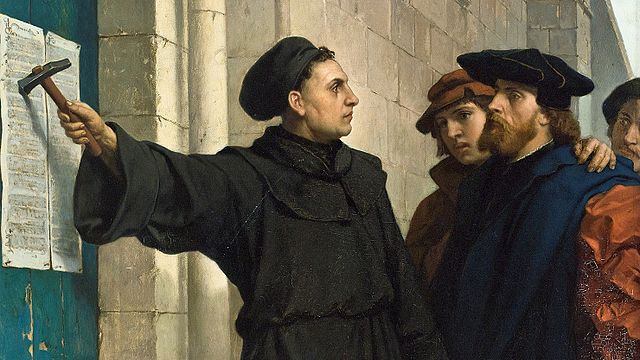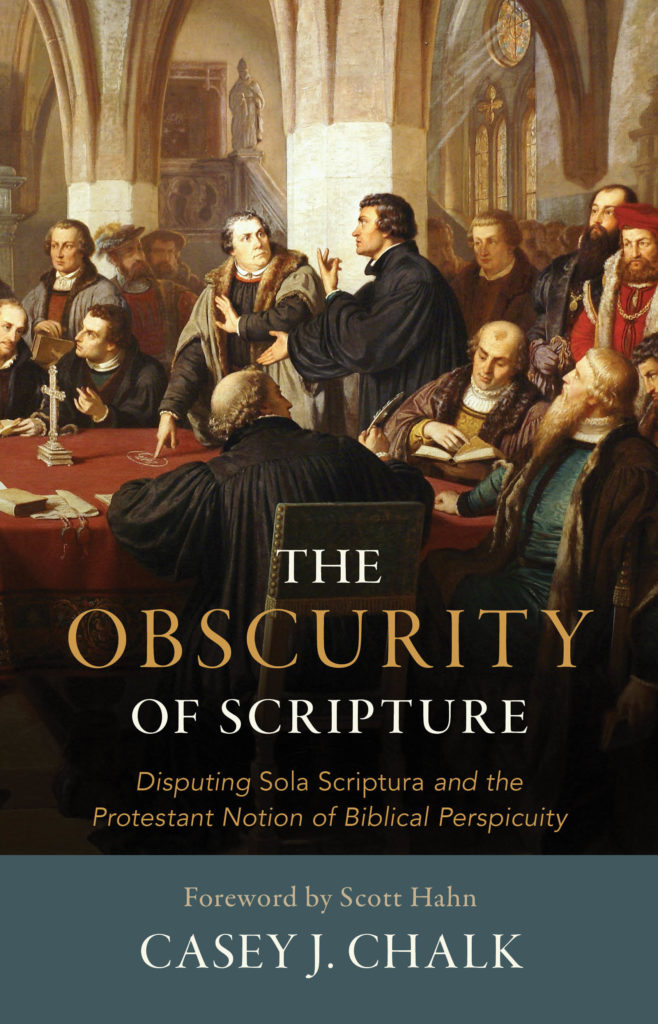
Unsurprisingly, once the Reformation dispensed with an accepted interpretive authority to arbitrate theological disagreements, competing theological and interpretive ideas multiplied like wildfire, with no way to resolve them. These problems began almost immediately after Luther’s ideas took hold across Germany and then the European continent. Catholic humanist and Church critic Erasmus, writing only a few years after the Reformation, asked Luther:
Why do your “brothers” disagree so much with one another? They all have the same Scripture, they all claim the same spirit. And yet Karlstadt disagrees with you violently. Sodo Zwingli and Oecolampadius and Captio, who approve of Karlstadt’s opinion though not of his reasons for it. Then again Zwingli and Balthazar are miles apart on many points. . . . Since you are all treating the subject matter of Scripture, if there is no obscurity in it, why is there so much disagreement among you?
Robert Bellarmine, writing of this fissiparous proliferation more than a hundred years after Luther, similarly observed: “Lutherans were hardly born before they began to be divided into Anabaptists, Confessionists, and Sacramentarians; and again, individual sects in some and other seven to 34 different ones, and this was in the time of Staphylus. Now, however, they number nearly 100 very different sects advancing one Luther.” Anabaptists, for example, argued in opposition to Luther that infant Baptism could not be justified based on Scripture alone.
Contemporaneous to Bellarmine, Catholic apologist and Genevan Bishop St. Francis de Sales noted the remarkable diversity of opinions within Protestantism only a century after the Reformation. His observations are worth quoting in full:
What contradictions has not Luther’s reformation produced! I should never end if I would put them all on this paper. . . . Calvin holds it to be contrary to the Scripture that there is a head in the Church; the English hold the reverse; the French Huguenots hold that according to the Word of God priests are not less than bishops; the English have bishops who govern priests, and amongst them two archbishops, one of whom is called primate, a name which Calvin so greatly detests; the Puritans in England hold as an article of faith that it is not lawful to preach, baptize, pray, in the Churches which were formerly Catholic, but they are not so squeamish in these parts. And note my saying that they make it an article of faith, for they suffer both prison and banishment rather than give it up. Is it not well known that at Geneva they consider it a superstition to keep any saint’s day?—yet in Switzerland some are kept; and you keep one of Our Lady. The point is not that some keep them and others do not, for this would be no contradiction in religious belief, but that what you and some of the Swiss observe the others condemn as contrary to the purity of religion.
Are you not aware that one of your greatest ministers teaches that the body of our Lord is as far from the Lord’s Supper as heaven is from earth, and are you not likewise aware that this is held to be false by many others? Has not one of your ministers lately confessed the reality of Christ’s body in the Supper, and do not the rest deny it? Can you deny me that as regards justification you are as much divided against one another as you are against us—witness that anonymous controversialist. In a word, each man has his own language, and out of as many Huguenots as I have spoken to I have never found two of the same belief.
But the worst is, you are not able to come to an agreement—for where will you find a trusted arbitrator? You have no head upon earth to address yourselves to in your difficulties; you believe that the very Church can err herself and lead others into error: you would not put your soul into such unsafe hands; indeed, you hold her in small account. The Scripture cannot be your arbiter, for it is concerning the Scripture that you are in litigation, some of you being determined to have it understood in one way, some in another. Your discords and your disputes are interminable, unless you give in to the authority of the Church.
The leaders of the Reformation believed the problems of late medieval Christianity were not moral, but doctrinal. To address them, they turned to the Bible.
In doing so, as de Sales’ above comments so poignantly describe, they unintentionally introduced a multiplicity of new disagreements over the nature of Christianity itself, as well as how to properly ascertain it. These doctrinal controversies were universal and endless, while religio-political conflicts between Catholics and magisterial Protestants (e.g., Lutherans, Calvinists) in the sixteenth and seventeenth centuries were both destructive and inconclusive. Moreover, the supposed self-evidence of Scripture in the first generations of the Reformation often led to convictions and positions that would be unrecognizable to many Protestants today.
If we include in the mix the “radical Protestants” who rejected the magisterial Protestants reliant on political approval from European princes, the dilemma of interpretive division is further exacerbated. Conrad Grebel (ca. 1498–1526), one of the original “Swiss Brethren” of Zurich, declared his community’s intention “to esteem as good and right only what may be found in pure and clear Scripture.” Such positions were common across the radical Reformers. Indeed, even in their heterogeneity they were simply following the example of the more politically secure magisterial Protestants. Writes Gregory:
Radical Protestants were doing exactly what the former Dominican Martin Bucer, Luther’s humanist colleague Philipp Melanchthon, Andreas Osiander, Wolfgang Capito, Johannes Oecolampadius, Johannes Bugenhagen, and every other politically protected Protestant reformer did: they rejected objectionable moral communities whose claims they would not abide, convinced that the leaders of such communities taught falsehoods in place of God’s truth.
One salient example of this was the radical Protestant Balthasar Hubmaier, who believed that justification by faith alone, the heart of Luther's soteriology, was a “half-truth.”
Even Erasmus, who believed the Bible on its own was capable of societal and ecclesial reformation, was deceived on this point. The Dutch scholar believed that sincere Christians who read Scripture in good faith would appreciate its clear meaning and undergo moral transformation. Yet the early decades of the Reformation proved such hopes to be egregiously naïve. Rather than setting Christian theology on firmer ground and liberating the Bible from what they perceived as papal tyranny, the Reformers provoked endless arguments about scriptural interpretation that drove various branches of Protestantism in ever more obscure and contradictory directions.
CASEY J. CHALK holds degrees in History and Teaching from the University of Virginia and a Master’s Degree in Theology from the Notre Dame Graduate School of Theology at Christendom College. He serves as an editor or regular contributor for many publications, including The New Oxford Review, The Federalist, Crisis Magazine, The American Conservative, and The Spectator. He is the author of The Persecuted: True Stories of Courageous Christians Living Their Faith in Muslim Lands. Casey, his wife and their five children live in his native Northern Virginia.
You Might Also Like
Turn on Christian radio anywhere in the United States and see how long it takes before someone declares that “Scripture clearly teaches [fill in the blank].” There’s a reason for that, and it has to do with the very origins of Protestant Christianity more than five hundred years ago.
The Protestant Reformation coalesced around five core doctrines: sola scriptura, sola fide, sola gratia, solus Christus, and soli Deo gloria. But another founding principle served as bedrock for all of them: the doctrine of clarity, or perspicuity. According to this doctrine, which was upheld in various forms by all the major Reformers and remains central to Protestantism today, the Bible is clear enough so that any Christian, relying on the Holy Spirit, will be able to determine at least what is necessary for salvation, if not much more.
The Obscurity of Scripture: Disputing Sola Scriptura and the Protestant Notion of Biblical Perspicuity catalogues and analyzes the historical, theological, and philosophical dimensions of perspicuity and finds the doctrine not only confused but erroneous, destructive, and self-defeating. The Obscurity of Scripture exposes the hopeless dead ends of clarity and, through a consideration of Catholic teaching on the Bible, offers the only way out.
